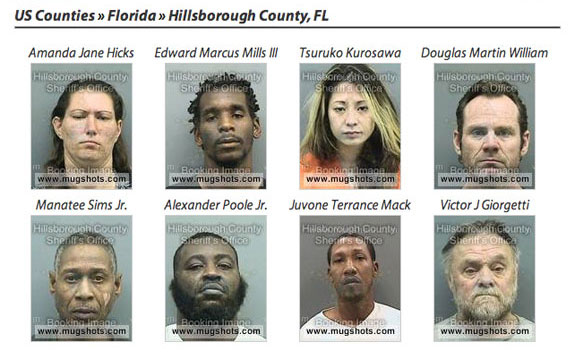
A partial screen shot from mugshots.com showing mug shots from Hillsborough County.
By Steve Miller
Florida Center for Investigative Reporting
State Rep. Carl Zimmermann, D-Dunedin, is tinkering with a seedy industry that relies on the First Amendment with a bill, HB677, which takes on the mug shot industry.
Yes, in the past few years, we’ve had bong bills, snake bills, bully bills. But never a proposed measure that would compel a website to remove information regarding dropped charges on a suspect. The practice is almost religion in Florida.
There is little question that these mug shot sites are a pox on open records, exploiting the crux of a free and open press.
From Zimmermann’s bill:
The operator of a website that contains the name and personal information, including any photograph or digital image, of a person charged with a crime shall, within 15 days after written notification from the person or the person’s designee, remove the person’s name and personal information if the person is acquitted or the charges are dropped or otherwise resolved without a conviction. The removal must be without charge to the person. Failure of the website operator to remove the person’s name or personal information shall result in a civil penalty of $100 per instance per week and, after 45 days, creates a presumption of defamation of character of the person.
Is Zimmermann’s bill overreaching, perhaps even misguided in a mission that certainly has some laudable elements?
A piece from the Nieman Journalism Lab asserts that Zimmermann’s bill fails to meet a Constitutional standard, and that “HB 677 cannot survive strict scrutiny” that the 2010 U.S. Supreme Court applied in United States. v. Stevens, a case that involved a presentation of dog fighting on video. The court upheld a ruling that the petitioner, Robert Stevens, was protected by the First Amendment in his production of the tapes.
The house bill comes out of nowhere, as Zimmermann has no connections to the law enforcement community. He stated the primary issues of his candidacy last year were property insurance, jobs and education. No mention of the nefarious mug shot problem.
He serves on the education committee, the K-12 subcommittee, the Higher Education and Workforce subcommittee and the Veteran and Military Affairs subcommittee. And there is no apparent special interest on his campaign donations that might precipitate this bill.
“It comes from an email I got from a constituent,” Zimmermann said. The resident told him she was mistakenly arrested and it took three years and $300 to get her mug shot removed from the Internet.
“It really comes down to the need to know versus the potential harm,” Zimmerman said. “These websites create a lot of potential harm.”
The mug shots presented by sites such as mugshots.com, mugshotsworld.com and arrests.org mine public records in a number of states, but Florida’s uniquely strong open records law makes the state an easy, low-resistance target.
The financial worth of these sites is blurry. Digsitevalue.net, one of the better outfits when it comes to assessing the metrics of a URL, puts a $188,762 value on mugshots.com, while giving arrests.org a $92,134 value and mugshotsworld.com a $20,421 value.
By comparison, Digsitevalue finds Amazon with a $130 million value. The Tampa Bay Times’ tampbay.com is given a value of $112,093.
There is also a living to be made charging former suspects to remove their mug shots from a site.
On Feb. 20, the day Zimmermann introduced his bill, Internetreputation,com, a Denver-based operation that presents itself as the “fastest and most reliable mugshot removal service,” issued a presser on PRNewswire with a Miami dateline and a promise of help.
A representative at Internetreputation.com did not return calls.
An examination of several mug shot sites finds a sad story; many are searched by people who are looking for missing loved ones, hoping to find them locked up, far better than a very sad alternative.
Some of these sites are registered offshore — Belize, Panama. Legal action can be a chore to commence in those places.
In Florida, the journalism establishment is also part of the mug shot industry. Tallahassee ABC affiliate WYXL runs a daily blast of those arrested, with their mug shots attached. The Sarasota Herald-Tribune and the Tampa Bay Times run photos of newly minted suspects.
The Florida Press Association fired off a letter to Zimmermann shortly after his bill hit the floor, asking that he yank it.
From the letter:
Despite the good intentions of the bill, we believe it severely infringes on free speech and freedom of press rights. The bill subjects political campaigns, the press, government agencies, and even social media users to monetary penalties and a damaging libel presumption for posting accurate original stories or images relating to a person’s arrest. By threatening these sanctions, the bill compels the press, political campaigns, government entities and even social media users to remove truthful digital information or digital images of a person charged with a crime.
“I never thought I’d find myself on the opposite side of the Florida Press Association,” said Zimmerman, who was named state Journalism Teacher of the Year in 2003 by the Florida Scholastic Press Association. “But my response is, ‘Let’s have dialog on this. We need to be able to define where we separate freedom of speech from harming people.’ ”
